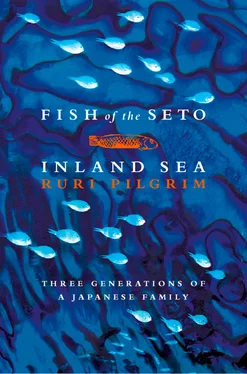1 ...8 9 10 12 13 14 ...20 Tetsu came out with a bucket of water and a floor cloth and left them in front of Haruko without speaking.
âI will show you how to clean the floor,â Rinji said. In front of the astonished Haruko, he knelt down on the floor with his knees apart and his heels together. Supporting himself on his spread-out left hand, he moved the cloth with his right hand from left to right and then, having turned the cloth upside down, wiped the boards this time right to left. He continued this way gradually going backwards. His bottom swayed rhythmically with the motion and Haruko thought it was most undignified. It was comical, too. It was something that she certainly had to tell Sachiko. Ayako would smile and Kei would laugh, Haruko was sure.
In what period of his life had Rinji taken up cleaning the floor, Haruko wondered. She had never seen a man doing housework. At the Shiraisâ even Matabei, who did almost everything else, was not expected to clean inside the house.
She received the cloth from Rinji and tried to wash and wring it as he did. The water was icy, and she thought of Tetsuâs large hands. When the cloth was soaked with water, it was too voluminous for the childâs hands to wring it. It was heavy and dripping.
âWatch it!â Rinji shouted. âWater will mark the floor. Wring it tight. Tighter. Tighter. I will teach you how to sweep the rooms after breakfast.â
Haruko was alarmed. âI must go to school,â she said. Already it was getting late.
âYou donât have to go to school today,â Rinji told her. âWe have more important things for a girl to do.â
Haruko had to dust the sliding screens. She had to polish shelves and sweep the tatami floor. All morning, the house was quiet except for the noise Haruko was making.
Rinji had very few visitors. At the Shiraisâ, there were always lots of people coming and going. First of all there were patients. Then there were relatives. Merchants called. The most popular merchant among the children was a man from the cake shop in town who came a couple of times a week. He brought a shallow box slung round his neck. The box was neatly sectioned and in each little square, there was a sample of an exquisite cake. They were mostly rice or bean-based and not only tasty but had lovely colours and shapes. Their names were artistic, too, âSpring Rainâ, âShower of Petalsâ, âAutumn Mistâ, âChrysanthemum in the Evening Sunâ, âDawnâ, and many more. The samples of cake changed according to the season. The cake man would be given a cup of tea while Kei was deciding what to order. The children often sat around hoping that their grandmotherâs choice would fall on their favourites.
The tofu man called every day as Tei-ichi had a piece for dinner with ginger and spring onions. Kei made a special citron and soya sauce for that dish. The man carried a pole across his shoulders with a tub hung from either end. He had a little brass trumpet that he would let the children blow if Tei-ichi was not looking. In summer, a goldfish man would call and, from her brocade purse, Ayako would give the children money.
Once a year in the autumn, a man came from Kyoto with a large bundle on his back. Even if it was a chilly day, he wiped his bald head with a folded handkerchief when he put down his load in the living room.
âAre you all well? Dannasama and young dannasama as well?â he would inquire politely. He brought silk. It was not the sort of material which Kei bought for daily kimonos; the silk was for special occasions such as New Yearâs Day when they had to dress up. The kimono dealer held the end of rolled material and, with a flip of his arm, spread lengths of cloth one after another across the tatami floor. Kei and Ayako would be deep in consultation, discussing and examining each piece.
âI thought this would particularly suit young Miwa okusama,â the man would say to Ayako. To Kei, he said, âSince you have given me such long patronage, I will make it as cheap as possible. If you just stand, please, allow me.â He draped a long and narrow cloth over Keiâs shoulder.
âWhat do you think, young Miwa okusama?â
Then they began to discuss the linings to go with the kimono material.
Kei and Ayako usually bought several pieces of material for the whole family, and, finally, presents for the servants were put aside as well.
Only the tofu man came to Rinjiâs house.
On the fourth day after Haruko arrived at Rinjiâs, Matabei came early in the morning bringing some fish and vegetables as presents.
That evening, Haruko was washing rice by the well at the back of the house. She heard a whisper, âHaruko nesan.â At first she thought it was her imagination. She was thinking of Sachiko and home. It was icy cold. She felt miserable and homesick.
âHaruko nesan.â It was Sachiko calling her from behind the hedge.
âQuick!â Sachiko said. âI came to get you. Letâs go home!â
Involuntarily, Haruko looked around. âIâll get my school things.â She tiptoed into her room and got all her books and pencils. She left her clothes.
Matabei had heard from the tofu man of Harukoâs plight and, having been there himself, told Kei and Ayako.
âPoor Haruko ojosama! Please being her home. She is too young and the dansama of the branch family does not know how to treat children. After all, he has no experience with them.â
Kei and Ayako were already concerned as Sachiko had been telling them of Harukoâs absence from school.
While the grown-ups were discussing how to deal with the situation, Sachiko heard them and decided to rescue her sister.
The two girls hurried out of the gate. Once outside, they ran. Evening stars were beginning to appear in the pale blue sky. After a while they were out of breath and stopped. Their cheeks were red but their hands were cold.
âHaruko nesan,â Sachiko said. Haruko took Sachikoâs hand and they walked home.
That night, Matabei carried a lantern and hurried back along the same path. He had two letters from Tei-ichi to deliver, one, a letter of explanation to Shobei, and the other, a letter of apology to Rinji.
The drama was soon forgotten in the excitement of the approaching New Yearâs celebration and Harukoâs uncle Yasuharuâs home-coming for a holiday from Tokyo.
Tei-ichi was just as pleased as the others to see his son but, to maintain his dignity, he made himself look specially glum on the day of Yasuharuâs arrival. Even so, he could not keep himself away from the rest of the household.
âKei.â He came out from the consulting room. âYasu might like a hot bath after a long journey.â
âYes,â Kei replied. âMata san has it ready.â
âHum! One does not want to make a fuss, but I thought it was essential.â
After ten minutes, he came out again.
âKei, what are we having tonight? He is coming home just for a holiday. You donât have to make anything special. Get the front path swept, will you? Oneâs front garden always has to be clean whether Yasu comes home or not.â
In the afternoon, Matabei brought round a cart. The children crowded around it and walked to the station with him. When Yasuharu appeared at the ticket barrier with a porter behind him, the children shrieked, âYasu ojisama!â The station master came out from his office to greet him. Passengers who got down from the same train bowed and wished him a good holiday before they parted.
A rickshaw was ready for Yasuharu. Shuichi sat on the cart with the luggage and the rest of the children sometimes ran in front, sometimes dragged behind, chatting and laughing.
Читать дальше












